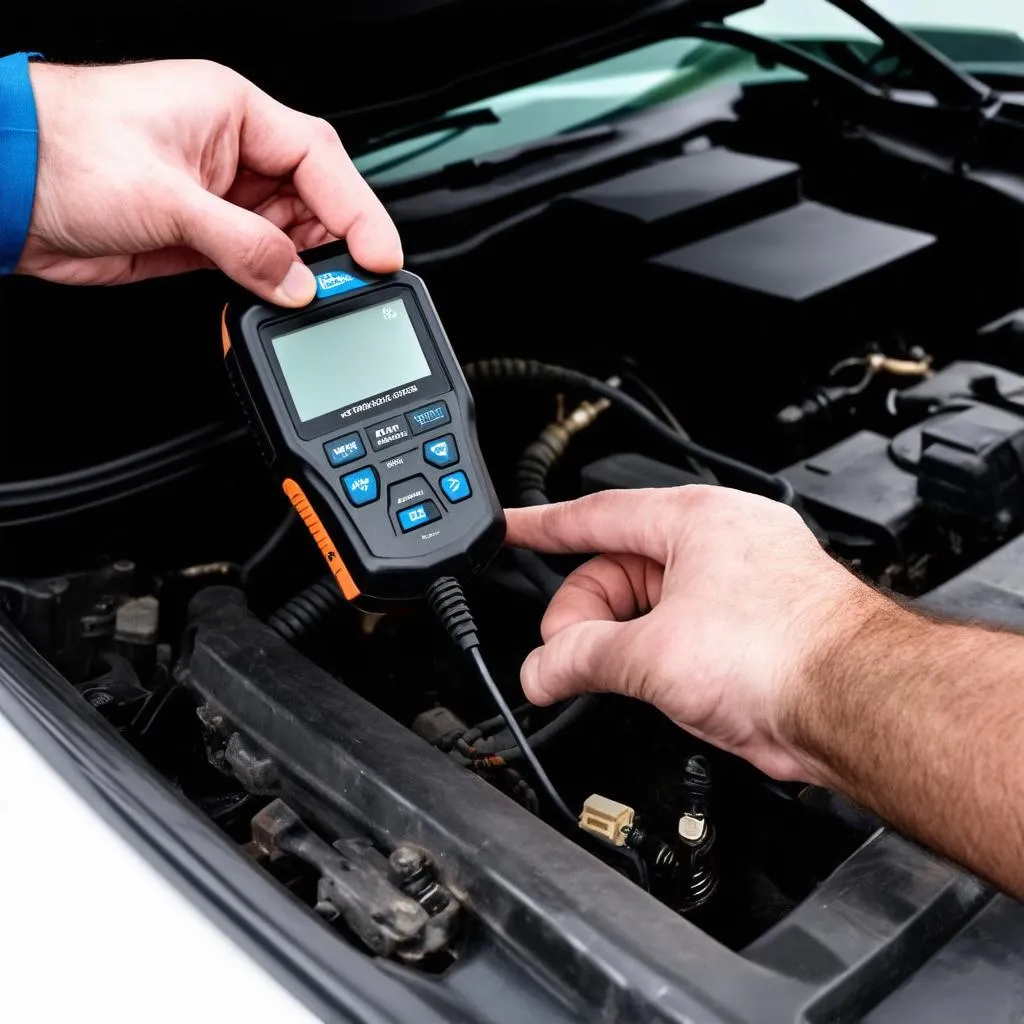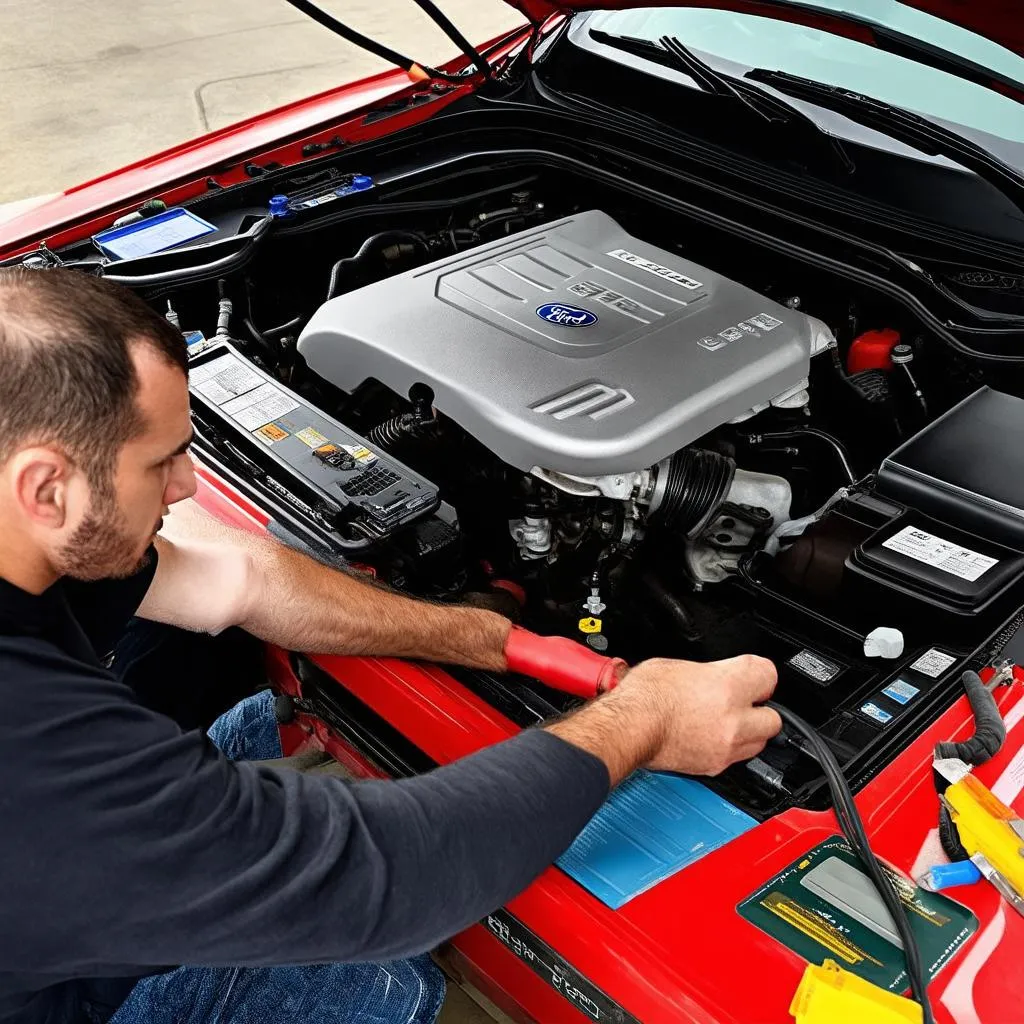Imagine this: You’re cruising down the highway in your trusty 2003 Ford Explorer, the wind in your hair (or at least, flowing through the AC vents). Suddenly, a pesky check engine light throws a wrench in your plans. Frustrating, right? Well, before you start picturing dollar signs flying out of your wallet, let’s talk about your car’s onboard diagnostic system, or OBD for short. This little technological marvel might just be your key to a quick and affordable fix.
Understanding the Power of the OBD Port
The OBD port, often tucked away under the dashboard on the driver’s side, is like your car’s own personal translator. It speaks the language of your vehicle, allowing you to understand what those blinking lights and cryptic codes really mean.
What Does OBD Do for My 2003 Ford?
For 2003 models, Ford implemented the OBD-II system, a standardized system that revolutionized car repair. Here’s how it helps you:
- Retrieving Diagnostic Trouble Codes (DTCs): Remember that check engine light? The OBD-II system stores a specific code that pinpoints the potential problem area, whether it’s a faulty oxygen sensor, a loose gas cap, or something more complex.
- Monitoring Emission-Related Systems: The OBD-II system keeps a close eye on your car’s emission control systems, ensuring you’re doing your part for the environment (and avoiding those pesky fines).
- Accessing Real-Time Data: Think of it as a live feed from your car’s brain. You can view information like engine speed, coolant temperature, and fuel system status, which can be incredibly helpful for diagnostics.
How to Use Your 2003 Ford’s OBD Port
To unlock the secrets of your car’s OBD port, you’ll need an OBD-II scanner. These handy devices come in a variety of forms, from simple code readers to advanced professional-grade scanners.
- Basic Code Readers: These affordable tools plug into the OBD port and display the stored DTCs. They’re a great option for DIY enthusiasts who want to understand basic issues.
- Advanced Scanners: Offering a deeper dive into your car’s systems, these scanners can access live data, perform advanced diagnostics, and even help with component activation for more complex repairs.
 OBD-II Scanner
OBD-II Scanner
Common 2003 Ford OBD-II Questions Answered
Here are some frequently asked questions about using the OBD system on 2003 Ford models:
Q: What does code P0401 mean on my 2003 Ford Focus?
A: This code often indicates an issue with the Exhaust Gas Recirculation (EGR) system, which helps reduce emissions. It could mean there’s insufficient flow detected, potentially caused by a blockage or a faulty EGR valve.
Q: Can I reset the check engine light using the OBD port on my 2003 Ford F-150?
A: Yes, most OBD-II scanners offer the ability to clear stored codes and reset the check engine light. However, it’s crucial to address the underlying problem that triggered the light in the first place.
Q: My OBD scanner isn’t reading any codes. What could be wrong?
A: Several factors could be at play:
- Check the connection: Make sure the scanner is securely plugged into the OBD-II port.
- Verify power: Ensure the ignition is in the “on” position (engine not running).
- Faulty scanner or fuse: Try a different scanner or check your car’s fuse box for any blown fuses related to the OBD system.
Choosing the Right OBD-II Scanner for Your 2003 Ford
With countless options available, finding the right OBD-II scanner can feel overwhelming. Consider these factors:
- Your Budget: Basic code readers offer an affordable starting point, while advanced scanners with more features will require a larger investment.
- Your Skill Level: If you’re comfortable with basic diagnostics, a code reader might suffice. For more in-depth analysis and repairs, a professional-grade scanner is worth considering.
- Specific Needs: Some scanners specialize in certain makes and models, offering enhanced functionality for Ford vehicles.
 Car Mechanic
Car Mechanic
Beyond Codes: The Holistic Approach to Car Care
While the OBD system is a powerful tool, it’s essential to remember that it’s just one piece of the puzzle when it comes to car maintenance.
Just like maintaining a healthy mind-body connection, keeping your car running smoothly involves a holistic approach. Regular servicing, fluid changes, and inspections, along with paying attention to unusual noises or vibrations, all contribute to a longer, healthier lifespan for your vehicle.
Need Help Navigating Your Ford’s OBD System?
Feeling overwhelmed or unsure where to start? Don’t hesitate to reach out for expert assistance. Our team of automotive specialists is available 24/7 to provide guidance on everything from choosing the right OBD scanner to diagnosing those pesky trouble codes. Contact us via WhatsApp at +84767531508 and let us help you get back on the road with confidence!
This article is for informational purposes only and should not be considered professional mechanical advice. Always consult with a qualified mechanic for any car repairs or diagnostics.